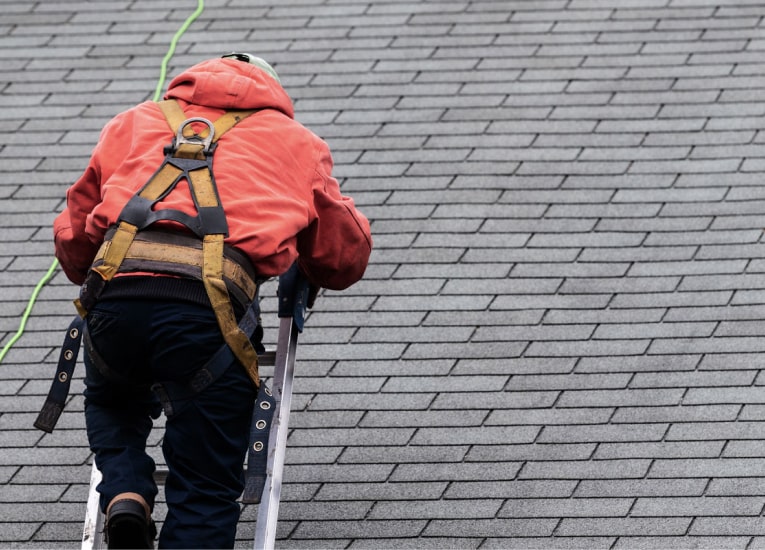Roof repair VS roof replacement: how to know what is a better choice for you? When a roof has extensive damage, the replacement is inevitable. In all other scenarios, only a meticulous evaluation of the issues can help you determine whether repairs are sufficient to keep your roof functioning.
Budget is an important factor. But, analyze both the current repair expense and the scope and frequency of future repairs. With the roof replacement, there will certainly be fewer repairs, but the initial price is higher.
So, the roof replacement vs repair dilemma requires a more comprehensive approach, and consideration of safety, longevity, and aesthetics.
Let’s explore different factors that help you determine if you can go away with less expensive roof repair, or replacement is the only solution.
Assessing the Roof’s Condition
If you don’t know whether to repair or replace roof, the first step is to evaluate the current roof condition. Here is what to keep in mind:
Age of the Roof
Roof naturally deteriorates over time, and after exposure to heavy weather conditions. In areas with frequent storms, ice, or high temperatures, roof lifespan is shorter than expected. Typically, roofs older than 20 years are more suited for a replacement.
Extent of Damage
Isolated damage, such as missing shingles or contained leakage can be repaired. Extensive damage on larger portions of the roof makes your roof a solid candidate for replacement.
Current Roofing Material
Metal and slate roofs have longer lifespans, with slate roofs lasting almost a century. Therefore, to decide what is better, roof repair or replace, for these roofs, consider additional factors.
For example, repairing tile roofs is labor intensive, so if the damage is big and the roof is older than 20 years, replacement is more beneficial in the long run.
Cost Considerations
The difference between roof repair and replacement cost is huge:
- Minor repairs, (for example, replacement of missing or damaged shingles) – between $200 and $1,000
- Moderate repairs (sectional roof replacement, fixing roof leaks) – between $1,000 and $3,000
- Large repairs (structural repairs) – $3,000+
On the other hand, a roof replacement costs significantly more, and the total cost depends on the roof size and material. On average, roof replacement may cost:
- Asphalt shingles $5,000 – $15,000
- Metal roofing $10,000 – $30,000
- Slate and tile roofing $15,000 – $40,000
The cost of roof repair and replacement are influenced by roofing material, roof design, the scope of the work, and labor costs in your area.
For example, if the damage on your roof is difficult to access and it expands on a large portion of the roof, the labor costs will increase. In addition, some roof materials, such as metal and slate are more expensive to repair and replace than asphalt shingles.
Contact roofing contractors for more accurate anticipation of costs for your roof.
Long-Term Costs
One-time roof replacement brings notable long-term savings because the new roof lasts for years without repairs. It also improves energy sufficiency and increases the value of your home.
Multiple repairs, on the other hand, increase the total costs of your roof maintenance. In addition, repairs can hide the underlying cause of the damage, which leads to more extensive problems and costly repairs.
Therefore, in many cases, the cost of roof replacement pays out in the long run.
Impact on Home Value
Minor repairs don’t increase your home value, but a well-maintained roof does. So, if you keep the roof in good condition, it contributes to overall appearance and home functionality.
Replacement of the roof increases your home value and improves the curb appeal, and you can think of it as an investment. Another thing to consider when deciding between a repair VS replace roof project, is the insurance premiums. Replacement can bring you different insurance benefits.
Duration and Effectiveness
The durability of the repair depends on several factors:
- Nature of the damage
- Quality of the materials repaired
- Extend of damage
- Overall roof condition
- Underlying cause of damage
Therefore, minor repairs can last several years before you’ll need to fix them again. On the other hand, repair of extensive damage may not last. That is especially true for repairs in which the underlying cause isn’t addressed or the damage is structural.
Roof replacement may give between 15 and 30 years of top-notch service if the roof has been installed properly. New roofs show better resilience in extreme weather like the one in Florida, require no repairs in years, come with warranties, and give homeowners peace of mind.
Energy Efficiency and Performance
In most cases, older roofs aren’t as energy efficient as the new ones, because of different materials, lack of ventilation, and natural age and wear. Repairing older roofs doesn’t improve energy efficiency and isn’t a definitive solution to the problems.
For instance, you may remove mold and mildew caused by moisture build-up in the attic and patch up the hole in the roof, but it won’t do much for the ventilation problem.
Roof replacement improves energy-efficiency of the roof through:
- Use of modern materials with better insulation properties
- Application of reflective coatings that deflect sunlight and reduce heat absorption
- Improved ventilation, preventing heat and moisture build-up
- Reduced energy consumption for cooling and warming
Therefore, despite larger upfront costs, replacement is a worthwhile investment, saving you money for repairs, utility bills and lowering your carbon footprint.
Timing and Urgency
If you have time to plan your project and think about whether to repair or replace roof shingles, it means that the situation isn’t urgent.
After destructive storms, where your roof suffers severe damage, threatening to collapse or leak a huge amount of water, immediate repairs are necessary. That way, you will prevent further damage and buy yourself time for a thorough roof damage assessment with a roofing contractor.
Planned replacement is a controlled home-improvement project you can opt for at the pace that suits you. You can take time to find the appropriate company, choose the right materials, and pick a time that works best for you and doesn’t disrupt your lifestyle too much.
Factors to Consider
If you still wonder should I repair or replace my roof, start by analyzing the following factors:
Budget
Repairs are cheaper, but replacements provide more benefits. Explore financing options to spread the cost.
Try to calculate the scope of future repairs and additional work you’ll have to do on your roof to determine the most cost-effective solution for your situation.
If complete replacement isn’t an option, don’t delay repairs and control the damage before it spreads out.
Local Climate
Weather patterns, storm frequencies, rainfalls, winds, and ice dams are important factors that contribute to the wear and tear of your roof.
Extreme weather not only shortens the lifespan of new roofs but also reduces the efficacy of the repairs.
Consider investing in a roof replacement with modern materials and reinforced protection against weather, if you assume the repairs won’t hold well against hurricanes or ice.
Professional Advice
A reliable contractor will analyze the current condition of your roof and suggest solutions based on your budget and preferences.
Decision-Making Process
For further guidance on roof projects, consider the following points.
- Get Multiple Quotes
Get multiple quotes from local contractors to compare the costs and their services for repair and replacement. Pick contractors who offer written estimates and a breakdown of costs, have a proven record of successful projects, and have a solid reputation in the area.
Explore their payment options to pick the contractor with the best conditions.
- Consider the Warranty
An important consideration is the warranty of the service. Repair warranties have limited scope, and shorter duration and exclude damage that occurred because of underlying causes and existing roof condition.
Replacement warranties cover the entire roof, the labor, and the material. Their duration is extended, often from ten to 30 years. In addition, some roofing contractors offer transferable warranties, which adds value to your property in case you are planning to sell it.
- Evaluate Your Home’s Needs
Access your future plans and preferences. Functionality and roof safety are top priorities, but do you value aesthetic, resale value improvement or are you looking for a more energy-efficient solution?
Some homeowners prefer quick fixes and appreciate the current home appearance, so a replacement might not suit them.
Key Takeaways
For major roof projects, extensive repair may be just as demanding and complex as whole roof replacement. However, it may not bring the additional benefits the replacement would, including better energy efficiency, extended warranty, and better performance.
On the other hand, minor repairs are affordable, easy to do, and may be good enough to maintain your roof’s protective properties.
But, to determine the most beneficial choice for your property, evaluate your budget and consult a reliable roofing contractor to get a professional opinion.
FAQ
What are the signs that my roof is failing, and replacement is inevitable?
If you wonder whether to repair or replace roof, keep in mind the indicators that replacement is necessary: sagging roof deck, widespread damage, roof age, extensive leaks, and visible damage.
Can I do a temporary repair before deciding on a replacement?
Yes, a temporary fix is possible. It will allow you to determine the scope of work and choose the best material and roof type for your climate, aesthetic preferences, energy-efficiency properties, and maintenance.
Which roof type is the most challenging to repair?
Because of the fragile material and complex installation, slate roofs are the most difficult to repair. Sate roofs have a historic significance so roof repair and replacement requires adhering to strict restoration standards.






